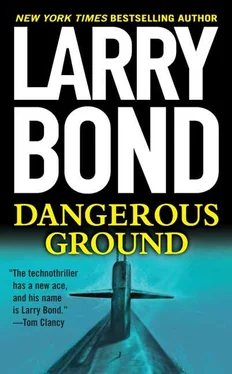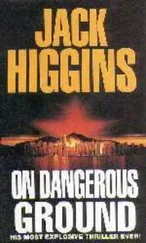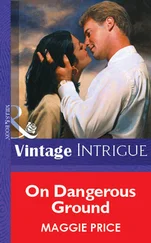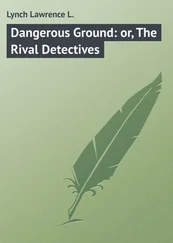He walked over to his desk and pointed to a pile of documents on one corner. “It’s all here, Yuri. Did you think we wouldn’t find out?”
Kirichenko’s blood suddenly froze and he fought to maintain control. What had they discovered?
Ventofsky picked up each document in turn as he spoke. “Inflating the threat, sending that incredible message to Gepard. Making up a story about some Western spy. What were you thinking?”
Kirichenko waited half a moment before responding. “I did not wish the American submarine to escape. It was important that the Northern Fleet corner or kill this boat. It would teach the Americans to respect our borders and it would show our own countrymen that the Navy is still an effective force, despite the paltry funding we are given. I want the world to respect us and the motherland!” Kirichenko poured the feigned patriotism on thickly; it was his only real defense and the Slavic Admiral would readily appreciate it.
“And any transgressions you made during that pursuit would be forgiven,” Ventofsky concluded. “Was that it?”
Kirichenko nodded. “I couldn’t let this sub escape. He’d penetrated our waters. He had to be prosecuted. We’d pursued him, attacked him, and may have even damaged him.”
“Which should have been enough of a victory, in my opinion,” Ventofsky argued sternly. “Instead, in violation of every regulation, you sent Gepard to attack a foreign submarine in international waters. Were you trying to start a war?” Ventofsky’s voice rose sharply as he asked the question.
“I was defending our territory.”
“You were trying to get that sub’s scalp to hang on the wall! Glory-hunting is. ” He trailed off, then sat down heavily on the edge of the desk. “So unbelievable from you. You were one of our best. You would have taken over from me in a year or two when I retire.”
“My intention was to protect the motherland,” Kirichenko lied.
“Everyone has good intentions. We needed your good judgment,” Ventofsky explained, “and you let us down.” He picked up a single sheet of paper and studied it briefly. “All right. You are attached to this office until your trial next week.”
Kirichenko paled, but Ventofsky’s tone was unforgiving. “We’ve lost seventy-three lives and a first-line nuclear submarine. There has to be a public accounting. You will be found guilty of poor judgment and malfeasance: exceeding your authority. In deference to your long service and good intentions, the court will not impose any jail sentence or fine. You will be discharged from the service without a pension.”
The former Commander of the Northern Fleet stood silently for a few moments, then said softly, “Thank you for not sending me to prison.”
“We owed you that,” Ventofsky replied, “but you owe the State for your actions as well. Use the time here to write your report. Do not communicate with Sergetev or anyone in your former command except through my office. I expect you’ll also want to make plans for your retirement.”
Inwardly, Kirichenko almost cheered. The Russian Navy did not want a long, public trial, and neither did he. They’d already finished the investigation, which meant that his secret was still safe, at least for a little while longer. The only unknowns were what did the Americans learn from their intrusion and would they announce their findings to the world? He doubted it, since they would then have to acknowledge their violation of international law and their involvement with the destruction of Gepard. No, they will remain silent, which would give him the time he needed to finish the arrangements.
He did have plans to make.
June 25, 2005
North Channel, United Kingdom
Jerry’s first breath of fresh air almost floored him. Memphis had been submerged since May 13, almost six weeks earlier. It was a cool evening, given an edge by a stiff northerly breeze that also rocked Memphis.
As he filled his lungs with the stuff, he focused on the stern light of the minesweeper a thousand yards ahead of him. Looking at something in the distance helped quiet his stomach. The minesweeper was also his guide to Her Majesty’s Naval Base Clyde, or Faslane in Scotland.
Jerry swept the binoculars around the horizon. For the Irish Sea, it was good weather, with a solid overcast but a clear horizon. In the distance he could see Scotland to port, while Ireland lay to starboard. Looking aft, he could see a British Type 23 frigate following in their wake. Jerry could also see the warship’s helicopters searching on all sides of them, and Memphis’ ESM antenna picked up their radars. It even picked up the radar signals from several fighters, orbiting unseen above the clouds.
Their Royal Navy escorts had met them when they surfaced, just south of the Hebrides Islands. It was a carefully timed rendezvous that not only brought them in late in the day, but when there were no Russian satellites overhead. While it would have been preferable to return in darkness, it just wasn’t possible this far north so soon after the Summer Solstice. The sun was never far from the horizon and twilight lasted throughout the night. But as far as Jerry was concerned, that was just fine. He preferred navigating strange waters when he could see where he was going.
He’d studied the charts well enough to pick out the lights that marked the entrance to the Firth of Clyde. They were getting close to the turn.
“Bridge, Navigator. Mark the turn,” squawked the speaker on the bridge suitcase.
“Helm, bridge, left standard rudder, steady on course zero five zero.”
“Left standard rudder, steady on course zero five zero, helm aye.”
As Memphis swung to port, Hardy’s voice rang out from below, “Captain to the bridge.” Jerry and Al Millunzi moved out of the way as best they could to allow Hardy and Patterson up onto the flying bridge.
“Good evening, Captain, Doctor,” said Jerry.
“Good evening, gentlemen,” replied Hardy, in good spirits. “What’s our status?”
“We’re on track, Captain, and we’ve just entered the firth,” answered Millunzi. “We have good seas, good visibility, and lots of that hearty highland air.”
“Splendid! I was hoping to show Dr. Patterson some of the sights as we come into Scotland. Can you see Ailsa Craig yet?”
“Yes, sir,” Jerry responded. “You can just barely make it out, twenty degrees off the starboard bow.”
A craggy ocean pyramid, Ailsa Craig shoots up out of the sea to a height of over one thousand feet. It’s a small, barren volcanic island, only three-quarters of a mile long, in the middle of the Firth of Clyde. A spectacular sight, it is a favorite of mariners as they return home from the sea.
“Thank you, Mr. Mitchell. Dr. Patterson and I will be up here for a couple of hours, so carry on.”
“Aye, aye, sir,” replied Jerry and Millunzi.
As Memphis plied the firth, the clouds broke to the west and an incredible sunset greeted them. Patterson gasped and murmured about its beauty. Al Millunzi and Jerry shared small talk as they conned the boat toward the Cumbrae Islands, with the MPA regaling Jerry with tales of a great fish ‘n’ chips place in Glasgow that served huge fillets boiled in lard.
* * *
Lowell Hardy felt content, for the first time in a very long while. His boat and crew had done everything he had demanded of them, and more. He looked forward to when both he and Memphis could finally rest. Looking over at Joanna Patterson, he saw that she seemed a bit gloomy. He’d seen that face once or twice before in the wardroom, usually after long hours spent on the patrol report.
“All right, Dr. Patterson. What’s with the long face?”
Читать дальше












